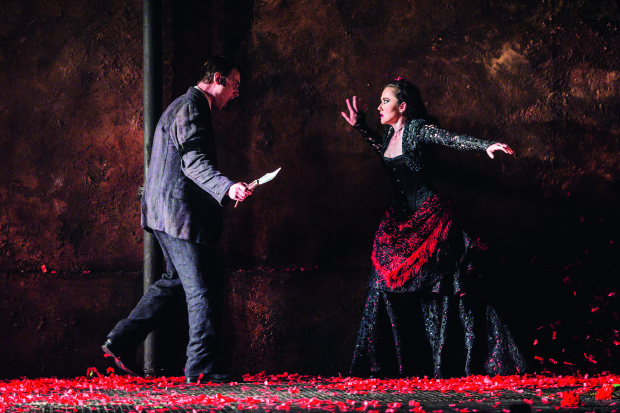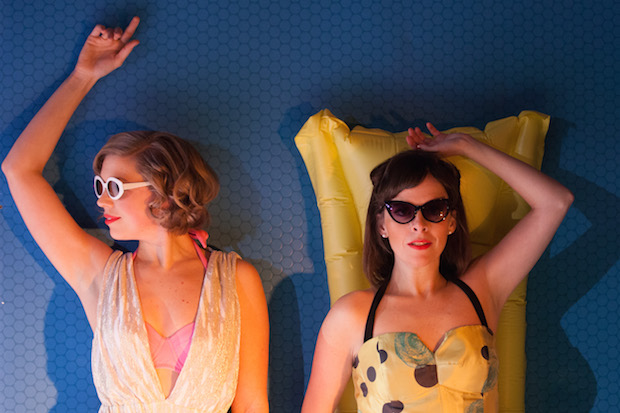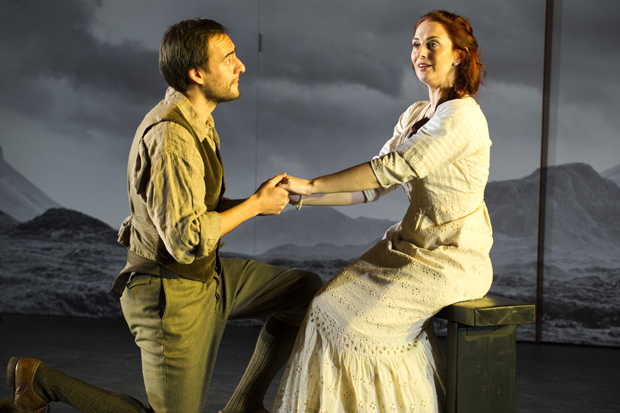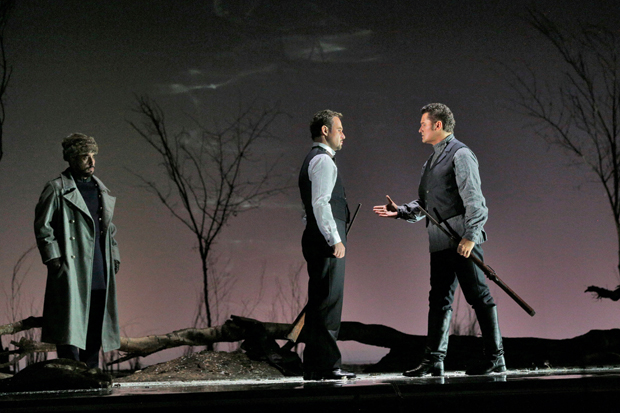What could be more delightful than going to Gyndebourne with someone who has never been before, arriving in time for a Figaro or Ha-Ha Tea at the Mildmay Hall, taking a stroll round the grounds, which incidentally have been considerably changed this year, and for the better (though the slightly alarming jungle near the opera house is still thriving in its sinister way), then going in for the first half of the opera, suitable exclamations from the newgoer about how enchanting it is, what wonderful sightlines, perfect temperature, and so forth, then in the long interval going to the Nether Wallop for the superb buffet, returning unbuttoned for the second half, and driving — in my case, being driven — tired but relaxed and stimulated home?
That’s what one imagines. Occasionally it’s like that, and, provided it’s at least a decent performance of a worthwhile piece, you’ll get back and feel that the day has been well spent, and I suppose the money too: critics are spoilt in that respect. But there are so many contingencies, of which the most tiresome and nerve-wracking is the travelling. From Cambridge, where I live, to Glyndebourne should take 2 hours and 10 minutes, according to Google: down the M11, then the M25, almost to Brighton on the M23, and then through or round Lewes until the first sign to Glyndebourne, two and a half miles before you get there. What actually happened this time was that about ten miles before the Dartford Bridge traffic slowed to such a degree that it took 90 minutes to get to the bridge, and despite having left Cambridge four hours before the opera began, we were ten minutes late for it. If it had been Tristan or Figaro it would have been a disaster. Coming back, the M11 was closed, so there was a huge detour on the M25. I know it’s tedious, but the opera critic’s life naturally has its fair share of these pleasure dampeners.
With no disrespect to Rameau’s genius, missing the first ten minutes of Hippolyte et Aricie is not a disaster, though of course regrettable; but discussions between deities as to who is the most powerful don’t do a lot for me; even the one at the opening of Monteverdi’s Poppea was in my opinion wisely cut by Raymond Leppard. This first opera of Rameau’s is evidently problematic, as I think the whole genre of the tragédie lyrique is. The first audiences apparently expected spectacle, dance, meaty drama and a happy ending, and thanks to many factors that is not a recipe that we can any longer accept, if we have a serious conception of opera — as we must, given the geniuses who have created it since. Rameau makes Handel seem like a paragon of concentrated relevance.
The director Jonathan Kent, interviewed in the programme book, naturally claims to be ‘reinventing Baroque opera for the 21st century’, but if, like me, you have a fairly vague but nonetheless delimited set of expectations about what constitutes the Baroque, you’ll be bound to feel that Kent has violated them. Goddesses appearing from the flies are all right, indeed obligatory, but to set Act I, the temple of Diana, in a giant refrigerator is not witty, or apposite, or convenient. These votaries of chastity are meant to be serious, but that’s hard to remember when they are standing next to man-sized frankfurters and lugging round tree-sized broccoli. Anyway, one hardly needs a fridge to make clear the quality of their inner lives, since Rameau’s music does that.
What presents a real problem is that nestling inside long stretches of rather dull choral music and tiresome dance is a poignant love story, set to powerful musical declamation. Mentioning Racine seems unfortunate, since his plays are wonders of compression and intensity, and don’t have to end happily. Still, Rameau’s Phaedre, as portrayed by Sarah Connolly, is a creation from Racine’s world, but only some of the time in appropriate company. She is in love with her stepson Hippolytus, dressed for tennis, but so passionately and beautifully acted and sung by Ed Lyon that their scenes are involving and indeed upsetting. Aricia, Hippolytus’ true beloved, also has lovely and touching music, and could hardly be better portrayed than by Christiane Karg.
Finest of all, though, is the Theseus of Stéphane Degout, so sublime a presence and magnificent a performer that the brevity of his role comes as a personal blow. The intimate drama in which they are involved is of an intensity which will hardly be equalled until Mozart’s Idomeneo. Excruciating, then, to have their scenes juxtaposed, or interrupted, with or by campy contemporary sailors, and other miscellaneous diversions. In the old days when there were highlights’ recordings one would have been able to get just the powerful drama, and discard the dross, but scholarly integrity no longer allows that, so we have to be bored and irritated as much as we are moved.
Got something to add? Join the discussion and comment below.
Get 10 issues for just $10
Subscribe to The Spectator Australia today for the next 10 magazine issues, plus full online access, for just $10.
You might disagree with half of it, but you’ll enjoy reading all of it. Try your first month for free, then just $2 a week for the remainder of your first year.












Comments
Don't miss out
Join the conversation with other Spectator Australia readers. Subscribe to leave a comment.
SUBSCRIBEAlready a subscriber? Log in